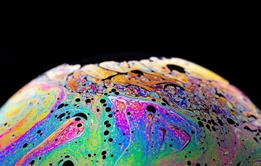Practical experiments, an interview and other activities for 11–16 year olds, examining the chemistry of crystals in scientific and everyday contexts
In this set of activities, students enhance their understanding of a range of ideas relating to the chemistry of crystals. Suitable for 11–16 year olds, the resources draw on familiar and scientific contexts and feature activities ranging from practical experiments to an interview with a protein scientist. Stimulate and engage your students while exploring:
- The properties of crystals
- How crystals form and how they can be grown
- How crystals can be used to study body chemicals like DNA and proteins
- Different beliefs about crystals
Each activity includes instructions for students, as well as editable worksheets and resources available for download.
1. What is a crystal?
Summary
Students reflect on their existing ideas about crystals, before looking at a range of solid substances using a hand lens and recording their observations. After deciding which of the substances are crystals, students work through a series of questions to check and develop their understanding of some of the key properties of crystals.
Download the resources
‘What is a crystal?’ worksheet
Plan a lesson around this activity
This activity can be used as part of a complete lesson plan for 11–14 year olds, exploring the structure and properties of crystals. The lesson plan features an alternative version of the worksheet designed for use as a group activity and includes suggestions for the solid substances.
2. Did you know about diamonds?
Summary
Students read a short text providing background information about diamonds. They then answer two questions designed to reinforce their understanding of the process behind the formation of diamonds, and why large diamonds are so rare.
3. Growing crystals: big or small?
Summary
Students conduct a practical experiment to investigate the effect of temperature upon crystal growth. They then work through a series of questions individually or in groups, identifying key differences between the crystals grown at higher temperatures and those grown at lower temperatures.
Download the resources
‘Growing crystals: big or small?’ worksheet
Plan a lesson around this activity
This activity can be used as part of a complete lesson plan for 11–14 year olds, exploring how crystals are made. Note: the lesson plan uses the set of questions for group work, not those for students working individually.
4. Growing crystals of ‘potash alum’
Summary
Students conduct a practical experiment in two stages to grow a crystal of ‘potash alum’ (or aluminium potassium sulfate). They then answer questions to check and reinforce their understanding of key points relating to the process, chemicals and apparatus involved in growing crystals.
The worksheet also features a list of possible extension experiments and suggested questions for investigation.
5. The body beautiful: protein crystals
Summary
Students read an interview with a protein scientist, exploring the process used to grow protein crystals in a laboratory. Students can also enact this interview if there is sufficient time. They then check and develop their understanding of what they have read through questions which address the methods described, the properties of proteins and the importance of growing protein crystals for science.
An additional handout provides further context and background information about x-ray crystallography.
Download the resources
‘The body beautiful: protein crystals’ worksheet
‘Did you know about x-ray crystallography?’ handout
Plan a lesson around this activity
This activity can be used as part of a complete lesson plan for 14–16 year olds, examining how scientists grow protein crystals. The lesson plan features an alternative version of the worksheet designed for use as a group activity.
Additional resources
- Try this complete lesson plan designed to investigate the fact and fiction behind claims about the properties of crystals.
- Find out more about the shape and formation of snowflakes using the handout ‘Did you know about snow?’ (includes questions for students).
- Download this ‘Key words’ handout to help students reinforce their knowledge of key terms relating to the chemistry of crystals.
Downloads
What is a crystal? worksheet
Editable handout | Word, Size 1.04 mbWhat is a crystal? worksheet
Handout | PDF, Size 74.61 kbDid you know about diamonds? worksheet
Editable handout | Word, Size 1.08 mbDid you know about diamonds? worksheet
Handout | PDF, Size 51.57 kbGrowing crystals: big or small? worksheet
Editable handout | Word, Size 1.03 mbGrowing crystals: big or small? worksheet
Handout | PDF, Size 52.71 kbGrowing crystals worksheet
Editable handout | Word, Size 1.04 mbGrowing crystals worksheet
Handout | PDF, Size 67.43 kbThe body beautiful: protein crystals worksheet
Editable handout | Word, Size 1.38 mbThe body beautiful: protein crystals worksheet
Handout | PDF, Size 83.18 kbDid you know about x-ray crystallography?
Editable handout | Word, Size 1.22 mbDid you know about x-ray crystallography?
Handout | PDF, Size 88.78 kbDid you know about snow? student sheet
Handout | PDF, Size 0.1 mbCrystal chemistry key words handout
Handout | PDF, Size 33.38 kb
Additional information
This activity was originally part of the Contemporary Chemistry website, compiled and published in 2004 with V. Kind’s Contemporary chemistry for schools and colleges.
Contemporary Chemistry

Try these activities and resources to engage 11–16 year olds with key chemical concepts, using a variety of scientific and everyday contexts.
- 1
- 2
 Currently
reading
Currently
reading
Crystal chemistry
- 4
- 5
- 6
- 7
- 8
- 9
- 10
- 11







































No comments yet